Free Online Productivity Tools
i2Speak
i2Symbol
i2OCR
iTex2Img
iWeb2Print
iWeb2Shot
i2Type
iPdf2Split
iPdf2Merge
i2Bopomofo
i2Arabic
i2Style
i2Image
i2PDF
iLatex2Rtf
Sci2ools
CORR
2002
Springer
2002
Springer
The Fastest and Shortest Algorithm for All Well-Defined Problems
An algorithm M is described that solves any well-defined problem p as quickly as the fastest algorithm computing a solution to p, save for a factor of 5 and loworder additive terms. M optimally distributes resources between the execution of provably correct p-solving programs and an enumeration of all proofs, including relevant proofs of program correctness and of time bounds on program runtimes. M avoids Blum's speed-up theorem by ignoring programs without correctness proof. M has broader applicability and can be faster than Levin's universal search, the fastest method for inverting functions save for a large multiplicative constant. An extension of Kolmogorov complexity and two novel natural measures of function complexity are used to show that the most efficient program computing some function f is also among the shortest programs provably computing f. 1 Published in the International Journal of Foundations of Computer Science, Vol. 13, No. 3, (June 2002) 431
Related Content
| Added | 18 Dec 2010 |
| Updated | 18 Dec 2010 |
| Type | Journal |
| Year | 2002 |
| Where | CORR |
| Authors | Marcus Hutter |
Comments (0)

